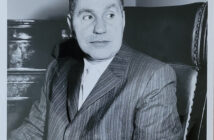In a season of religious holidays there is an oddly secular feel to New Year celebrations in the Christian world. Indeed, the revelries surrounding the birth of a new year were (and to some extent still are) seen by Christians as excessive and paganistic. The Roman Catholic liturgical year does not recognize January 1st as the New Year. Rather, Advent marks the beginning of Roman Catholic yearly cycle.
(It may be interesting to note, however, that the origins of Polish New Year celebrations center on Pope Sylvester I, who, in legend, trapped a terrible dragon named Leviathan. This scourge upon humanity was, according to the story, supposed to escape his prison in the year 1000, bringing the end of the world. When the world did not end on January 1st the remembrance of St. Sylvester became a holiday, replete with raucous celebrations.)
The other two major monotheistic world religions celebrate the New Year at different dates on the Gregorian calendar. While there are technically four starting days on the Jewish calendar, (each of which serves a different purpose in the Jewish liturgical cycle) Rosh Hashanah (Hebrew for “Head of the Year”) is the most commonly referenced. It is a day of rest, much like Shabbat, and as such the heavily duty partying us Americans might identify with the New Year holiday is not observed. Islam, which follows on a non-Gregorian calendar as well, celebrates the first day of Muharram as the New Year, but this momentous occasion is greeted with much the same solemnity that the other two monotheistic religions accord it.
So where does our vice-ridden New Year merriment find its roots? Do other cultures celebrate the New Year in such a ostentatious way?
Many ancient societies celebrated New Year in the spring, as the year’s crops began to appear. The Babylonians observed the holiday Akitu, which lasted for ten days. It was capped off with massive parties.



